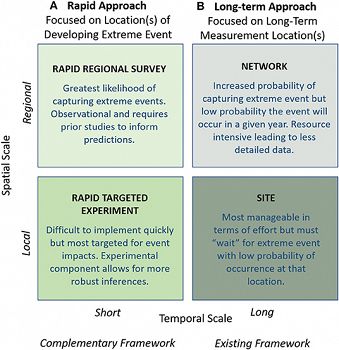Redmond et al., 2019
Targeting Extreme Events: Complementing Near-Term Ecological Forecasting With Rapid Experiments and Regional Surveys
Redmond M.D., Law D.J., Field J.P., Meneses N., Carroll C.J.W., Wion A.P., Breshears D.D., Cobb N.S., Dietze M.C. and Gallery R.E. (2019)
Frontiers in Environmental Science 7: 183
-
Catalina-Jemez, INVESTIGATOR, COLLABORATOR
-
Catalina-Jemez, INVESTIGATOR
-
Catalina-Jemez, INVESTIGATOR
-
Catalina-Jemez, INVESTIGATOR
Abstract
Approaches used for near-term ecological forecasting that vary in spatial and temporal scale. Rapid approaches (A) complement existing long-term studies (B) to improve near-term ecological forecasting of ecological events driven by extreme climate events. Blue text details the pros and cons of each spatiotemporal quadrant for near-term ecological forecasting
Ecologists are improving predictive capability using near-term ecological forecasts, in which predictions are made iteratively and publically to increase transparency, rate of learning, and maximize utility. Ongoing ecological forecasting efforts focus mostly on long-term datasets of continuous variables, such as CO2 fluxes, or more abrupt variables, such as phenological events or algal blooms. Generally lacking from these forecasting efforts is the integration of short-term, opportunistic data concurrent with developing climate extremes such as drought. We posit that incorporating targeted experiments and regional surveys, implemented rapidly during developing extreme events, into current forecasting efforts will ultimately enhance our ability to forecast ecological responses to climate extremes, which are projected to increase in both frequency and intensity. We highlight a project, "chasing tree die-off," in which we coupled an experiment with regional-scale observational field surveys during a developing severe drought to test and improve forecasts of tree die-off. General insights to consider in incorporating this approach include: (1) tracking developing climate extremes in near-real time to efficiently ramp up measurements rapidly and, if feasible, initiate an experiment quickly—including funding and site selection challenges; (2) accepting uncertainty in projected extreme climatic events and adjusting sampling design over-time as needed, especially given the spatially heterogeneous nature of many ecological disturbances; and (3) producing timely and iterative output. In summary, targeted experiments and regional surveys implemented rapidly during developing extreme climatic events offer promise to efficiently (both financially and logistically) improve our ability to forecast ecological responses to climate extremes.
Citation
Redmond M.D., Law D.J., Field J.P., Meneses N., Carroll C.J.W., Wion A.P., Breshears D.D., Cobb N.S., Dietze M.C. and Gallery R.E. (2019): Targeting Extreme Events: Complementing Near-Term Ecological Forecasting With Rapid Experiments and Regional Surveys. Frontiers in Environmental Science 7: 183. DOI: 10.3389/fenvs.2019.00183
 This Paper/Book acknowledges NSF CZO grant support.
This Paper/Book acknowledges NSF CZO grant support.
Explore Further





